-
 Bitcoin
Bitcoin $113900
-1.39% -
 Ethereum
Ethereum $3517
-4.15% -
 XRP
XRP $3.009
1.59% -
 Tether USDt
Tether USDt $0.9997
-0.04% -
 BNB
BNB $766.8
-1.41% -
 Solana
Solana $164.6
-2.38% -
 USDC
USDC $0.9998
-0.02% -
 TRON
TRON $0.3277
0.65% -
 Dogecoin
Dogecoin $0.2023
-1.67% -
 Cardano
Cardano $0.7246
0.05% -
 Hyperliquid
Hyperliquid $38.27
-4.77% -
 Sui
Sui $3.528
-0.52% -
 Stellar
Stellar $0.3890
-0.73% -
 Chainlink
Chainlink $16.16
-2.69% -
 Bitcoin Cash
Bitcoin Cash $539.9
-4.38% -
 Hedera
Hedera $0.2425
-2.00% -
 Avalanche
Avalanche $21.71
-0.97% -
 Toncoin
Toncoin $3.662
5.73% -
 Ethena USDe
Ethena USDe $1.000
-0.02% -
 UNUS SED LEO
UNUS SED LEO $8.964
0.35% -
 Litecoin
Litecoin $107.7
2.33% -
 Shiba Inu
Shiba Inu $0.00001223
-0.40% -
 Polkadot
Polkadot $3.617
-0.97% -
 Uniswap
Uniswap $9.052
-2.49% -
 Monero
Monero $295.1
-3.79% -
 Dai
Dai $0.9999
0.00% -
 Bitget Token
Bitget Token $4.315
-1.85% -
 Pepe
Pepe $0.00001060
0.11% -
 Cronos
Cronos $0.1342
-2.72% -
 Aave
Aave $256.0
-0.87%
In which countries or regions can Bitcoin ETFs be legally purchased?
The availability of Bitcoin ETFs varies globally, with the U.S. a key battleground, Canada offering accessible markets, and Europe showing a fragmented regulatory landscape.
Mar 31, 2025 at 03:00 pm
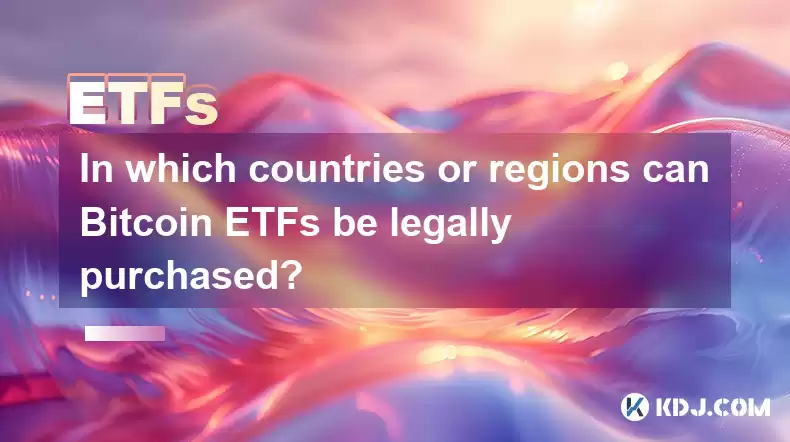
The Global Landscape of Bitcoin ETF Availability
The availability of Bitcoin exchange-traded funds (ETFs) varies significantly across the globe. Regulatory hurdles and differing approaches to cryptocurrency oversight create a complex picture. While some jurisdictions have embraced Bitcoin ETFs, others remain hesitant or outright prohibit them. This article explores the current state of Bitcoin ETF legality in various regions.
Currently, the United States is a key battleground for Bitcoin ETF approval. Several applications are under review by the Securities and Exchange Commission (SEC), a process marked by both approvals and rejections. The SEC's decisions significantly influence the global landscape, as its stance impacts investor confidence and market sentiment. The criteria for approval often center on market manipulation concerns and investor protection.
In Canada, several Bitcoin ETFs are already listed and traded on major exchanges. This makes Canada one of the most accessible markets for Bitcoin ETF investors. The regulatory environment has been relatively more favorable, leading to quicker approvals compared to other regions. However, Canadian regulations are still evolving, and investors should remain informed about any changes.
Europe presents a more fragmented picture. Individual countries within the European Union have their own regulatory frameworks, impacting the availability of Bitcoin ETFs. While some countries might have more lenient approaches, others may lag behind in developing clear regulatory guidelines. This inconsistency creates challenges for investors seeking cross-border access to these products.
Brazil has also seen progress in the Bitcoin ETF space, with approvals granted for certain products. This reflects a growing acceptance of cryptocurrencies within the country's financial system. However, the regulatory landscape is still developing, and investors should carefully monitor any changes to regulatory requirements.
In Australia, the regulatory environment for Bitcoin ETFs is evolving. While there are no currently approved Bitcoin ETFs, discussions and proposals indicate potential future developments in this area. The Australian Securities and Investments Commission (ASIC) plays a critical role in determining the path forward for Bitcoin ETF listings.
Many Asian countries are still in the early stages of developing their regulatory frameworks for cryptocurrencies, including Bitcoin ETFs. Some countries have shown a more cautious approach, while others are actively exploring ways to regulate the space. The regulatory landscape is constantly evolving, and investors should carefully research the specific rules in each jurisdiction.
Other regions around the world generally lack clearly defined regulatory frameworks for Bitcoin ETFs. This makes the purchase and trading of such products challenging, if not impossible, in these areas. The lack of clear regulations creates uncertainty and risks for investors.
The process of purchasing a Bitcoin ETF generally involves these steps:
- Opening a brokerage account: You'll need an account with a brokerage firm that offers access to the relevant exchange where the Bitcoin ETF trades.
- Funding your account: Deposit funds into your brokerage account to purchase the ETF shares.
- Placing an order: Submit an order to buy the desired number of Bitcoin ETF shares.
- Monitoring your investment: Regularly track the performance of your investment.
Frequently Asked Questions
Q: Are Bitcoin ETFs the same as directly owning Bitcoin?
A: No. A Bitcoin ETF invests in Bitcoin indirectly, often through a trust or other structure. Directly owning Bitcoin involves holding the cryptocurrency itself in a digital wallet. Each approach carries different levels of risk and complexity.
Q: What are the risks associated with investing in Bitcoin ETFs?
A: Bitcoin ETFs are subject to the price volatility of Bitcoin itself. Market fluctuations can lead to significant gains or losses. Regulatory changes and market manipulation are also potential risks to consider.
Q: Are Bitcoin ETFs regulated?
A: The regulatory landscape varies by country. In jurisdictions where they are available, Bitcoin ETFs are generally subject to securities regulations, designed to protect investors. However, the level of regulation and oversight can differ significantly.
Q: What are the tax implications of investing in Bitcoin ETFs?
A: Tax implications depend on your location and the specific rules governing capital gains and investment income in your jurisdiction. Consult a tax professional for personalized advice.
Q: Where can I find more information on the regulatory status of Bitcoin ETFs in my country?
A: Consult the websites of your country's securities regulator or relevant financial authorities. You can also seek advice from a qualified financial advisor.
Q: What are the fees associated with Bitcoin ETFs?
A: Fees vary depending on the specific ETF and brokerage. These fees can include management fees, expense ratios, and brokerage commissions.
Q: Can I buy Bitcoin ETFs on any brokerage platform?
A: No. Only brokerage platforms that offer access to the specific exchange where the ETF trades will allow you to purchase it. The availability also depends on your location and the regulatory environment.
Disclaimer:info@kdj.com
The information provided is not trading advice. kdj.com does not assume any responsibility for any investments made based on the information provided in this article. Cryptocurrencies are highly volatile and it is highly recommended that you invest with caution after thorough research!
If you believe that the content used on this website infringes your copyright, please contact us immediately (info@kdj.com) and we will delete it promptly.
- Worldcoin, Identity, WLD Price: Decoding the NYC Crypto Buzz
- 2025-08-02 21:10:12
- Shiba Inu: Utility and Community Strength Drive Crypto's Evolution
- 2025-08-02 21:50:12
- Crypto Donations, Trump PAC, and Bitcoin: A New York Minute on Political Coin
- 2025-08-02 20:30:12
- Crypto Market Under Pressure: Bearish Momentum and Rising Volatility Take Hold
- 2025-08-02 20:30:12
- Crypto Market Carnage: Liquidations Soar as Ethereum and Bitcoin Take a Beating
- 2025-08-02 21:55:12
- DeFi Token Summer Gains: Is Mutuum Finance the Real Deal?
- 2025-08-02 18:30:12
Related knowledge
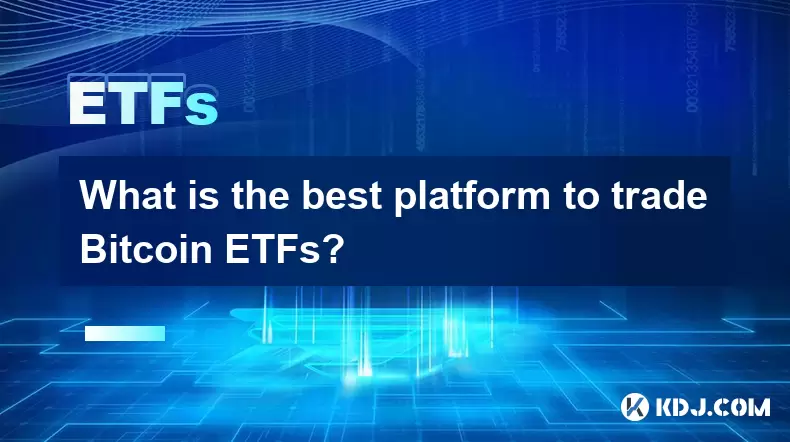
What is the best platform to trade Bitcoin ETFs?
Jul 23,2025 at 04:14am
Understanding Bitcoin ETFs and Their Role in TradingBitcoin Exchange-Traded Funds (ETFs) have gained significant traction among traditional and crypto...

What is the best platform to trade Bitcoin ETFs?
Jul 17,2025 at 03:50pm
Understanding Bitcoin ETFs and Their Role in the MarketBitcoin Exchange-Traded Funds (ETFs) are investment vehicles that track the price of Bitcoin wi...
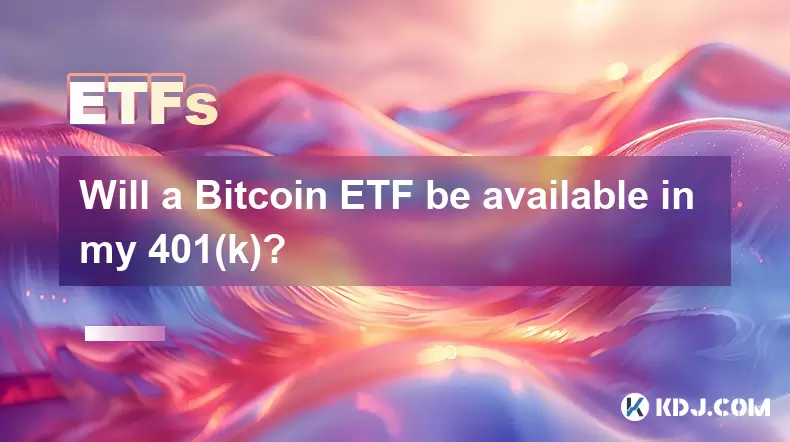
Will a Bitcoin ETF be available in my 401(k)?
Jul 17,2025 at 10:42pm
What is a Bitcoin ETF?A Bitcoin ETF (Exchange-Traded Fund) is an investment vehicle that tracks the price of Bitcoin without requiring investors to di...
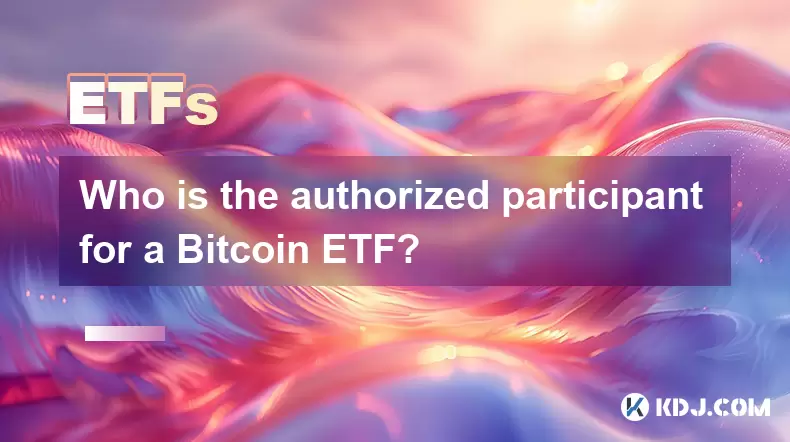
Who is the authorized participant for a Bitcoin ETF?
Jul 18,2025 at 12:42am
Understanding the Role of Authorized Participants in Bitcoin ETFsIn the context of Bitcoin Exchange-Traded Funds (ETFs), an authorized participant (AP...
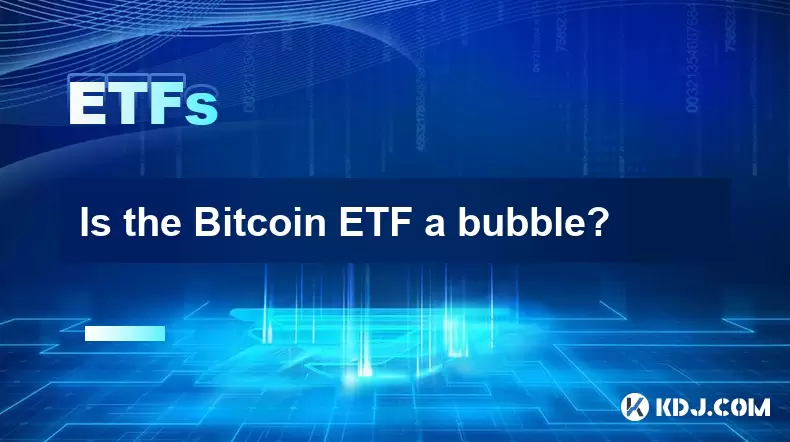
Is the Bitcoin ETF a bubble?
Jul 20,2025 at 06:57am
Understanding the Bitcoin ETF ConceptA Bitcoin Exchange-Traded Fund (ETF) is a financial product that aims to track the price of Bitcoin without requi...
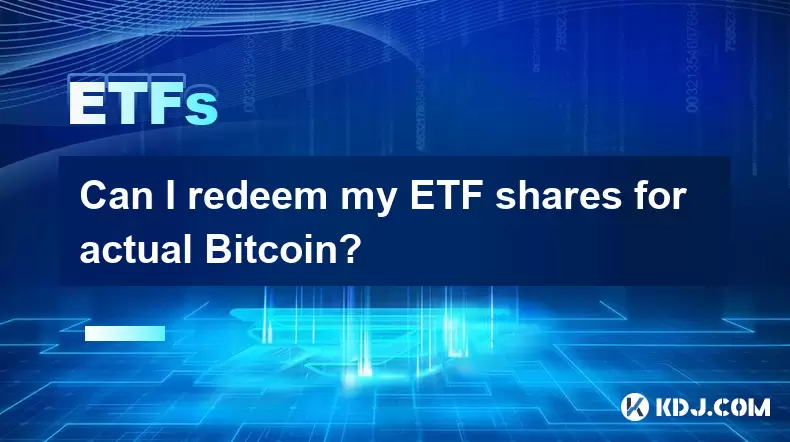
Can I redeem my ETF shares for actual Bitcoin?
Jul 17,2025 at 03:14pm
Understanding ETF Shares and Their Relation to BitcoinExchange-Traded Funds (ETFs) have become a popular investment vehicle for those looking to gain ...

What is the best platform to trade Bitcoin ETFs?
Jul 23,2025 at 04:14am
Understanding Bitcoin ETFs and Their Role in TradingBitcoin Exchange-Traded Funds (ETFs) have gained significant traction among traditional and crypto...

What is the best platform to trade Bitcoin ETFs?
Jul 17,2025 at 03:50pm
Understanding Bitcoin ETFs and Their Role in the MarketBitcoin Exchange-Traded Funds (ETFs) are investment vehicles that track the price of Bitcoin wi...

Will a Bitcoin ETF be available in my 401(k)?
Jul 17,2025 at 10:42pm
What is a Bitcoin ETF?A Bitcoin ETF (Exchange-Traded Fund) is an investment vehicle that tracks the price of Bitcoin without requiring investors to di...

Who is the authorized participant for a Bitcoin ETF?
Jul 18,2025 at 12:42am
Understanding the Role of Authorized Participants in Bitcoin ETFsIn the context of Bitcoin Exchange-Traded Funds (ETFs), an authorized participant (AP...

Is the Bitcoin ETF a bubble?
Jul 20,2025 at 06:57am
Understanding the Bitcoin ETF ConceptA Bitcoin Exchange-Traded Fund (ETF) is a financial product that aims to track the price of Bitcoin without requi...

Can I redeem my ETF shares for actual Bitcoin?
Jul 17,2025 at 03:14pm
Understanding ETF Shares and Their Relation to BitcoinExchange-Traded Funds (ETFs) have become a popular investment vehicle for those looking to gain ...
See all articles

























































































